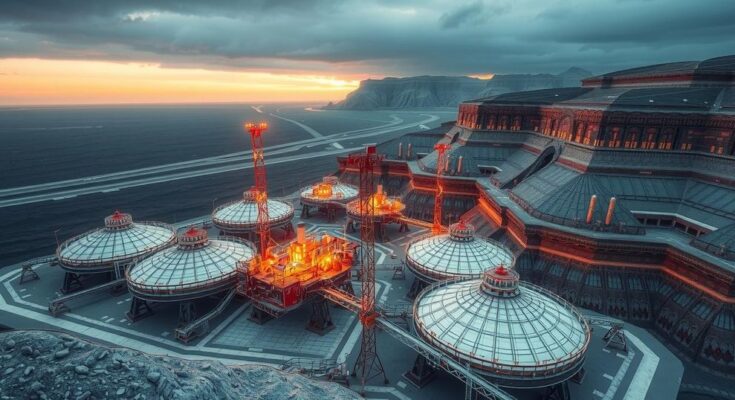Iran is facing a severe energy crisis characterized by power blackouts and fuel shortages, despite having substantial natural gas and oil reserves. This situation results from mismanagement, international sanctions, and climate change, leading to unheated homes and economic losses. The dependency on low-quality fuel highlights environmental health concerns, raising critical questions about the future of Iran’s energy policies and infrastructure.
Iran, a nation rich in natural resources, is currently facing a significant energy crisis exacerbated by mismanagement, sanctions, and climate change. Despite possessing the second-largest proven natural gas reserves and ranking fourth in crude oil globally, the country has been subjected to frequent power blackouts and fuel shortages, affecting millions of citizens. Government officials attribute the crisis to high energy consumption and insufficient fuel supply; however, long-standing underinvestment, coupled with sanctions, has severely hindered the capacity of the energy infrastructure to meet the demands arising during harsh winters.
Families are enduring unheated homes through one of the coldest winters experienced in recent years, making daily life increasingly challenging. In Tehran, for instance, residents are compelled to wear multiple layers of clothing and stay bundled up just to remain warm. Businesses are suffering losses due to unpredictable and prolonged blackouts, which also compromise safety on major highways that fall into darkness each night.
The combination of climate change and international sanctions complicates the situation. The rising energy demands triggered by extreme weather conditions clash with the country’s outdated infrastructure. Furthermore, sanctions imposed on Iran have curtailed efforts to modernize the power grid and obtain cleaner fuel technologies. As a result, power plants are resorting to using mazut, a low-grade oil that contributes to the persistent smog engulfing Tehran, leading health specialists to express concerns about increasing pollution-related fatalities.
This ongoing power crisis poses critical questions about Iran’s energy future and whether systemic reforms and investments in renewable energy could reverse the adverse trajectory. The struggles faced by Iran offer lessons to other Middle Eastern nations, presenting an opportunity to enhance their own energy systems to withstand both climate and geopolitical challenges effectively.
The current energy crisis in Iran illustrates a complex interplay of factors including rich natural resources yet persistent shortages. Despite its vast reserves of natural gas and crude oil, the country faces blackouts during crucial winter months. Mismanagement of infrastructure, compounded by sanctions from Western nations, has crippled the ability to deliver consistent energy. Additionally, the impact of climate change exacerbates these issues, as seasonal demands strain the already weakened power grid. This situation raises significant concerns about public health and safety amidst pollution and economic challenges.
In summary, Iran’s energy predicament highlights a profound contradiction: a nation abundant in natural resources struggling with blackouts due to a combination of infrastructural mismanagement and external pressures such as sanctions and climate change. Without substantial reforms and investment in sustainable energy solutions, Iran’s energy crises are likely to persist, prompting broader implications for the region. Other Middle Eastern nations could learn from this scenario to fortify their energy infrastructures against similar challenges.
Original Source: scoopempire.com




